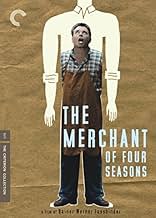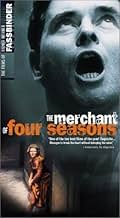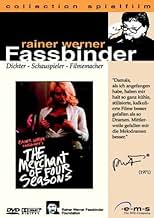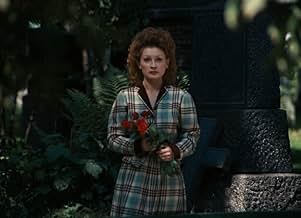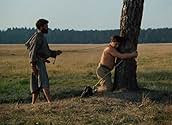El comerciante de las cuatro estaciones
Título original: Händler der vier Jahreszeiten
CALIFICACIÓN DE IMDb
7.3/10
5.5 k
TU CALIFICACIÓN
Hans Epp, un hombre con tendencias autodestructivas, busca significado a la vida vendiendo fruta sin conseguirlo, y su desafección se convierte en desesperación.Hans Epp, un hombre con tendencias autodestructivas, busca significado a la vida vendiendo fruta sin conseguirlo, y su desafección se convierte en desesperación.Hans Epp, un hombre con tendencias autodestructivas, busca significado a la vida vendiendo fruta sin conseguirlo, y su desafección se convierte en desesperación.
- Dirección
- Guionista
- Elenco
- Premios
- 3 premios ganados y 5 nominaciones en total
Walter Sedlmayr
- Fruit cart salesman
- (as Walther Sedlmayer)
El Hedi ben Salem
- The Arab
- (as Salem El Heïdi)
- Dirección
- Guionista
- Todo el elenco y el equipo
- Producción, taquilla y más en IMDbPro
Opiniones destacadas
The Merchant of Four Seasons is a film about a lack of love. The film starts off with the main character; Hans Epp, returning from a spell in the foreign legion. He returns to his mother, not to be told how much she loves him, or how much she's missed him; but to be told that he is worthless and, even worse, that she would have preferred the man he went with to have come back instead. It is the character's relation to women that makes this film so hateful; the fact that his wife is taller than him is symbolic of his relation to the other gender; he is consistently humiliated by them, and it is through his relations with them that his life isn't as great as it could have been. This is also shown clearly by the way he treats his wife after a drink. He lost his job as a policeman through lust for a woman, and even his wife; a woman that is supposed to love him, never really shows any affection for him. Even at the end, his wife is more bothered about what her and her daughter will do than the state of her husband.
The Merchant of Four Seasons is a thoroughly unpleasant film. There isn't a scene in the movie where someone is happy, and not only that; but the movie seems deliriously blissful to wallow in the misery of it's central characters. The movie is certainly not recommended to anyone who is currently having a hard time, that's for sure. Despite all the misery, the film never steps out the bounds of reality; every event in this movie can - and most probably has - happened, and that only serves in making the movie more shocking. The film is, of course, helmed by Rainer Werner Fassbinder; the cult German director that committed suicide in 1982. This is only my second taste of the man's work, but through just two films, it is easy to get an idea of the type of art that he creates. Both films are downtrodden and gritty - yet realistic pieces of art. His characterization in this movie is subtle; we only ever get to know the characters through their plight's and not through their character. This is a very clever way of showing the audience that it is their surroundings that define the people in the film, not the people themselves - and as nearly everyone that sees the film knows what living in an urban society is like, it wont difficult for the majority of people to relate to.
The Merchant of Four Seasons is not a film that is easily forgettable; the movie is high on substance and low on style, and that makes for a very memorable picture, and one that everyone who considers themselves to be a fan of cinema should experience. It is with that in my mind that I give this film my highest recommendations; it's not sweet and it's not pleasant, but you will not see a more realistic portrayal of depression, and this is most certainly a movie that will stay with you.
The Merchant of Four Seasons is a thoroughly unpleasant film. There isn't a scene in the movie where someone is happy, and not only that; but the movie seems deliriously blissful to wallow in the misery of it's central characters. The movie is certainly not recommended to anyone who is currently having a hard time, that's for sure. Despite all the misery, the film never steps out the bounds of reality; every event in this movie can - and most probably has - happened, and that only serves in making the movie more shocking. The film is, of course, helmed by Rainer Werner Fassbinder; the cult German director that committed suicide in 1982. This is only my second taste of the man's work, but through just two films, it is easy to get an idea of the type of art that he creates. Both films are downtrodden and gritty - yet realistic pieces of art. His characterization in this movie is subtle; we only ever get to know the characters through their plight's and not through their character. This is a very clever way of showing the audience that it is their surroundings that define the people in the film, not the people themselves - and as nearly everyone that sees the film knows what living in an urban society is like, it wont difficult for the majority of people to relate to.
The Merchant of Four Seasons is not a film that is easily forgettable; the movie is high on substance and low on style, and that makes for a very memorable picture, and one that everyone who considers themselves to be a fan of cinema should experience. It is with that in my mind that I give this film my highest recommendations; it's not sweet and it's not pleasant, but you will not see a more realistic portrayal of depression, and this is most certainly a movie that will stay with you.
THE MERCHANT OF FOUR SEASONS was Rainer Werner Fassbinder's first shot at mainstream acceptance. In a turbulent career of just fifteen years, he managed to create an astounding body of work in film and theater, both as a performer and a creative producer, actor, and director. Although this movie might not appeal to many viewers, the film has much to offer. The storyline is fairly straightforward. A man is ostracized from his upper middle class family due to emotional and economic problems, and proves unable to control his downward spiral. THE MERCHANT OF FOUR SEASONS is shot with a slavish devotion to elegant detail, and each set is very carefully designed and constructed. Every object on set seems painstakingly arranged so as to provoke layers of emotional texture. Many religious paintings and icons decorate the walls of the various rooms and seem to speak to Hans's desperate quest for spiritual meaning or direction in his life. Much thought was given to how lighting and color were employed to contrast and enhance the drama. Several times during the film, I froze the frame to marvel at the beauty of the shot's composition. I streamed this film, and the print was nearly flawless and second to none. Fassbinder employs his actors in an almost vehement "Anti-Natural' style. He does everything possible to prevent the actors from reacting in a normal or colloquial manner, and this creates a rather stilted effect. However, by doing so, he injects an almost 'hyper-reality' to the narrative. Rather than the presentation of a mundane melodrama, the actors almost militant lack of affectation forces the viewer to confront the film in a different manner. Fassbinder's film intentionally prevents the viewer from easily connecting with the characters' trials and tribulations. You are constantly on the outside, looking in. This will be a disconcerting experience for many, but I found it to be a unique and satisfying artistic adventure.
In Fassbinder's earlier films, his ideas sometimes surpased his ability to execute them. He was always a great writer, but it took him some time to get his style of camera work and storytelling down pat.
The Merchant of Four Seasons is one of Fassbinder's first movie to make great use of color, from the bright green pears in the merchant's cart to the bright red roses at the funeral (a funeral in a Fassbinder movie? who'd have thought).
His camera work was getting there too, but it was still fairly minimalist. The occasional zooms seem a bit uncomfortable at times and unnatural, but then again, Fassbinder was still coming out of his purely avant garde phase. This might be because Michael Ballhaus isn't behind the camera, but instead the slightly inferior Dietrich Lohmann.
Still, this is Fassbinder, and you get your fix here. Broken dreams shown so vividly and unflinchingly as to alienate audience and drive them into a depressed stupor. Just what the doctor ordered. An early classic that shows remarkable progression when compared to his first films released only 2 years prior.
The Merchant of Four Seasons is one of Fassbinder's first movie to make great use of color, from the bright green pears in the merchant's cart to the bright red roses at the funeral (a funeral in a Fassbinder movie? who'd have thought).
His camera work was getting there too, but it was still fairly minimalist. The occasional zooms seem a bit uncomfortable at times and unnatural, but then again, Fassbinder was still coming out of his purely avant garde phase. This might be because Michael Ballhaus isn't behind the camera, but instead the slightly inferior Dietrich Lohmann.
Still, this is Fassbinder, and you get your fix here. Broken dreams shown so vividly and unflinchingly as to alienate audience and drive them into a depressed stupor. Just what the doctor ordered. An early classic that shows remarkable progression when compared to his first films released only 2 years prior.
I didn't find this film as accessible as 'Fox & his Friends' but it was a moving portrayal of a typical Fassbinder victim figure, the eponymous barrow-boy, Hans Epp, whose hopes and dreams are eventually crushed by stultifying conformity (family & society). Some of the scenes are exaggerated (the family confrontations) but I particularly liked the sequence where Hans is desperately searching for meaning & comfort; he tries to find some peace in natural surroundings, goes back to his first lost love in order to recapture past feelings (she's only interested in a quick fling before her husband returns) and visits his sister, perhaps the only person who has any degree of sympathy for him, only to find she's too busy with work.
A poignant story of a vulnerable inarticulate man crushed by his mundane surroundings and bourgeoise, middle-class German values obsessed with economic success and a upward mobility that conveniently papers over the cracks of its more disturbing past.
A poignant story of a vulnerable inarticulate man crushed by his mundane surroundings and bourgeoise, middle-class German values obsessed with economic success and a upward mobility that conveniently papers over the cracks of its more disturbing past.
I rented the movie at the local library, since I had years earlier seen Angst Essen Die Seele Auf, and liked it. It started very interesting with Hans Epp returning from a spell with the Foreign Legion, but the first thing his mother told him was how he was a failure and always would be. "Was ist traurig VorMittag ist noch traurig NachMittag" But I found the actors in this movie to be like zombies. It might be that they just depicted a dreary every day life, but I felt midways into the film that I don`t need to have these pictures inside my head, so I pressed the stop button and in stead put on the other film I had rented at the library, an episode of Star Trek Voyager.
Not that this is a bad movie, it was just tragic to watch at the time.
Not that this is a bad movie, it was just tragic to watch at the time.
¿Sabías que…?
- TriviaAndrea Schober's debut.
- ConexionesFeatured in Sehnsucht nach Sodom (1989)
Selecciones populares
Inicia sesión para calificar y agrega a la lista de videos para obtener recomendaciones personalizadas
- How long is The Merchant of Four Seasons?Con tecnología de Alexa
Detalles
Taquilla
- Presupuesto
- DEM 325,000 (estimado)
- Total en EE. UU. y Canadá
- USD 8,144
- Fin de semana de estreno en EE. UU. y Canadá
- USD 11,623
- 16 feb 2003
- Total a nivel mundial
- USD 8,158
Contribuir a esta página
Sugiere una edición o agrega el contenido que falta

Principales brechas de datos
By what name was El comerciante de las cuatro estaciones (1972) officially released in India in English?
Responda


